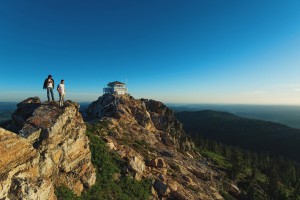Describe Your Trip in Russian: The Outdoors Posted by Maria on Aug 3, 2015 in Russian for beginners
We are wrapping up a 3-post series on talking about your trip in Russian. This time, we will cover the great outdoors! Perhaps some of you are planning to go camping in Russia or would simply like to share the stories of your adventures.
Location
First of all, a word you will hear a lot in discussions of all things outdoors is приро́да. It literally means “nature” but can refer to things as diverse as the environment, the outdoors, or the countryside:
- Тогда́ в ближа́йшие го́ды мы переста́нем загрязня́ть приро́ду,―сказа́л губерна́тор Оле́г Чиркуно́в. (Then we will stop polluting the environment in the near future, said Governor Oleg Chirkunov.) [Семен СЫТЫХ. Мусор становится ценным ресурсом // Комсомольская правда, 2011.05.13]
- В выходны́е то́лпы отдыха́ющих е́дут на приро́ду, что́бы порыба́чить и́ли пожа́рить шашлыки́. (Scores of people leave the city for the weekend to go fishing or grill shashlyk in the countryside.) [Светлана ГОЛУБ. Около трехсот жителей Краснодарского края пострадало от клещей // Комсомольская правда, 2011.05.12]
- А бо́льше всего́ подцепи́ть клеща́ риску́ют да́чники и се́льские жи́тели, кото́рые рабо́тают на приро́де и́ли де́ржат скот. (People who own country homes, dachas, and rural inhabitants who work outdoors or raise cattle run the greatest risk of tick bites.)[Виктория АНИСИМОВА. Как уберечься от клещей? // Комсомольская правда, 2011.05.12]
 In any case, if you want to have picnic in the woods, you can announce your plans as “Мы пое́дем на приро́ду.” If you want to describe where you spent your weekend, you would say “Мы бы́ли на приро́де.”
In any case, if you want to have picnic in the woods, you can announce your plans as “Мы пое́дем на приро́ду.” If you want to describe where you spent your weekend, you would say “Мы бы́ли на приро́де.”
A popular destination for outdoor getaways is лес (the woods):
Ка́к-то мы с отцо́м прие́хали к нему́ на да́чу и отпра́вились вме́сте с ним на прогу́лку в лес. (Once time, my father and I visited him at his dacha and went for a walk in the woods with him.) [И. Э. Кио. Иллюзии без иллюзий (1995-1999)]
What you can see in the woods are дере́вья (trees, sing. де́рево), кусты́ (bushes), трава́ (grass), ручьи́ (brooks), and живо́тные (animals, also known as зве́ри). Many Russian families spend the weekend going to the woods for a shish kebab (шашлы́к) barbecue or to gather berries and mushrooms ( грибы́ и я́годы). You have to be careful because some of them can be poisonous (ядови́тые)!
You may also end up in the го́ры (mountains) – в гора́х.
Спаса́тели призыва́ют тури́стов возде́рживаться от купа́ния и похо́дов в го́ры. (Rescuers ask that travelers avoid bathing and hiking in the mountains.) [Василиса Егорова. Аномальное похолодание в Таиланде: На Пхукете шторм разбил яхту. Отдыхающие сменили купальники на дождевики (ФОТО) // Новый регион 2, 2011.03.28]
Note that if you are talking about the destination for your trip, you need the accusative case: е́хать на приро́ду, в лес, в го́ры. If you are talking about the location of you trip, you will use the prepositional case: мы отдыха́ем на приро́де, в лесу́, в гора́х.
One other thing you will see flowing through the wild is a река́ (river).
Activities
Some of the typical things you can do include похо́д (a hike). Note that похо́д is typically a multi-hour endeavor with hiking gear somewhere in a remote or rugged terrain. Although we may refer to a 2-hour casual weekend trek through the park as a hike in English, in Russian, it is still a walk (прогу́лка).
Мы шли, не остана́вливаясь, часа́ три, безу́мно уста́ли и уже́ жале́ли, что пусти́лись в э́тот похо́д. (We hiked without stopping for about three hours, were insanely tired, and were already regretting going on this hike.) [Фазиль Искандер. Случай в горах (1980-1990)]
If you are spending the night outdoors, you will need a пала́тка (tent). To pitch a tent is ста́вить пала́тку. An important attribute of many a hike or picnic in the woods is костёр (a /camp/ fire). People gather around the fire (у костра́):
По́мнишь, в сове́тские времена́ все разу́мные лю́ди ходи́ли в похо́ды? Шли в лес как мо́жно да́льше, ста́вили пала́тки, разводи́ли костры́ и пе́ли под гита́ру. (Do you remember how in the Soviet times, all reasonable people went on hikes? They hiked deep into the woods, pitched tents, made fires, and sang campfire songs (to guitar accompaniment)). [Андрей Волос. Недвижимость (2000) // «Новый Мир», 2001]
Finally, шашлыки́ (shashlyk/shish kebab) is a popular dish for cookouts. These are pieces of marinated meat on a skewer (шампу́р) cooked over a fire or on a special grill called манга́л.

Build vocabulary, practice pronunciation, and more with Transparent Language Online. Available anytime, anywhere, on any device.




Comments:
Moonyeen Albrecht:
In the article above, this is written “If you are talking about the location of you trip, you will use the instrumental case: мы отдыха́ем на приро́де, в лесу́, в гора́х.” I think, instead of “instrumental case,” you meant to write “prepositional case” as the examples are in the correct case. Not a criticism; just a correction.
Maria:
@Moonyeen Albrecht Good catch, Moonyeen! I fixed it.
Tara:
I love reading your blogs. I love the language components. Very useful and practical! Do you a post about mushroom picking? I would love to see a kind of like beginners guide to mushroom picking and Russian names for mushroom in the Russian language. Thank you!
Maria:
@Tara Tara, thank you for your kind words. That’s an unexpected choice of subject, but I’ll give it a try!